Shopify vs Salesforce Commerce Cloud: A Fair Comparison
Are you weighing the pricing, features, pros, and cons of Shopify vs Salesforce to decide which one to choose for your eCommerce needs? If so, you have come to the right place.
In this article, we’ll review and compare the two world-renowned platforms under seven crucial aspects, including:
- #1. Pricing
- #2. Ease of use
- #3. eCommerce features
- #4. Marketing features
- #5. Templates and customization options
- #6. Third-party app integration
- #7. Customer support
Let’s dive right in!
An Overview Of Shopify vs Salesforce Commerce Cloud
Shopify pros & cons
Shopify is a hosted eCommerce platform that allows you to launch and manage an online store effortlessly. By paying a monthly subscription fee to Shopify, you get secure hosting for your website on their servers.
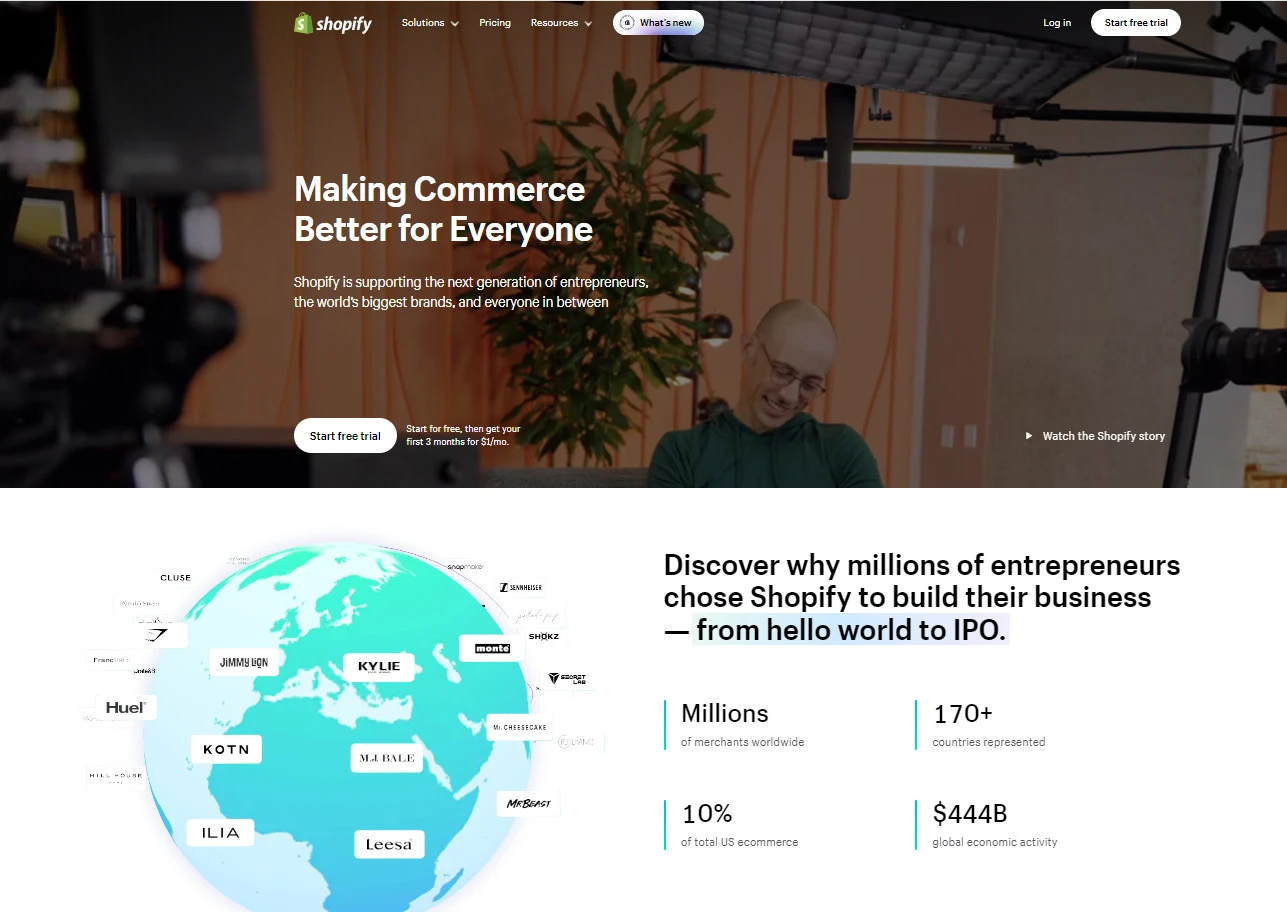
With Shopify, you receive an admin dashboard loaded with powerful features for customizing your site, adding products, handling orders, and processing payments.
This setup is similar to BigCommerce and other hosted platforms. However, Shopify stands out due to its ease of use, solid native features, and an expansive app store with over 8,000 apps, making it exceptionally user-friendly and versatile for online merchants.
Salesforce Commerce Cloud pros & cons
Salesforce Commerce Cloud is a highly scalable, cloud-based software-as-a-service (SaaS) eCommerce solution. It offers a comprehensive set of features designed to empower businesses to create unified, intelligent shopping experiences across all channels (online, mobile, social, and store).
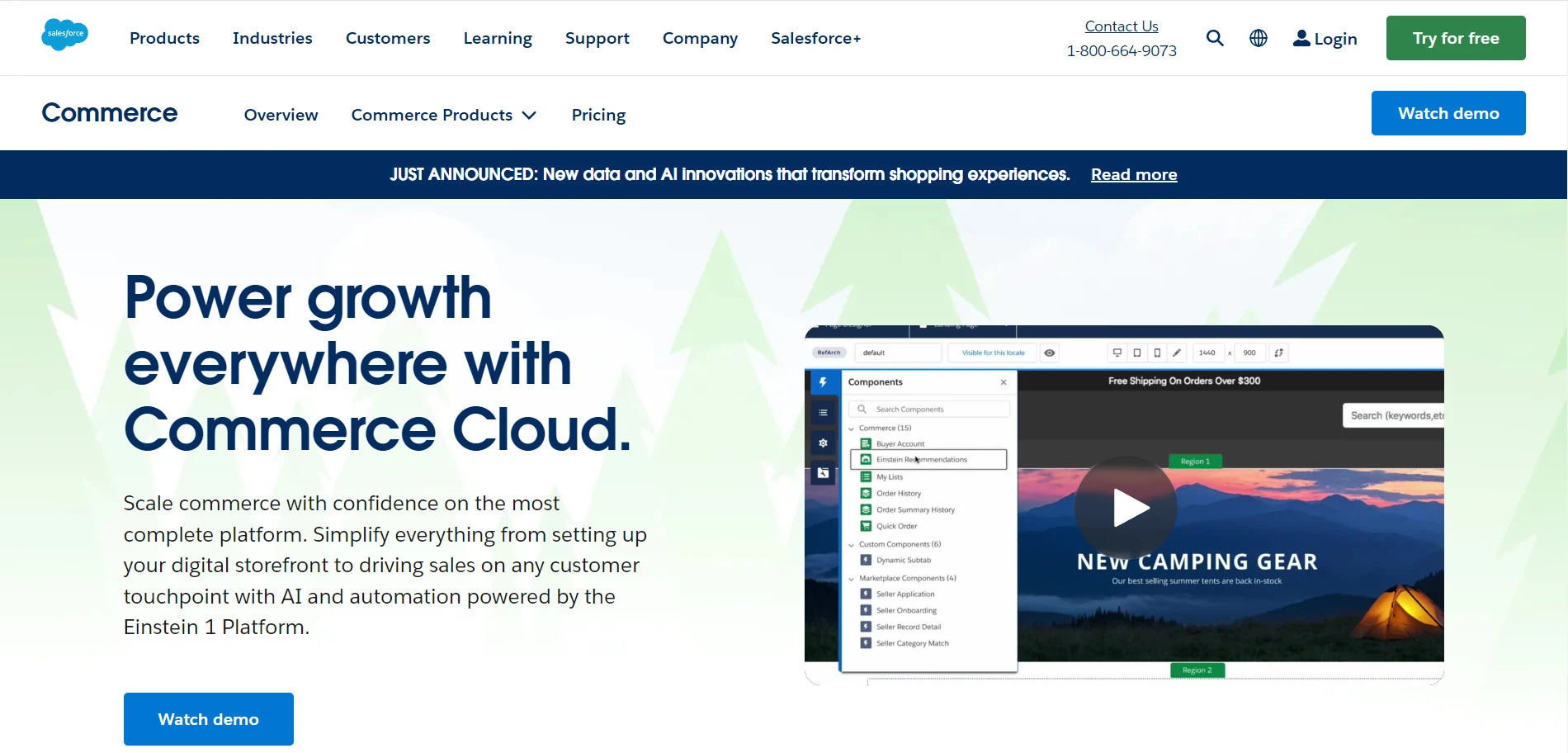
Salesforce Commerce Cloud operates on a multi-tenant architecture, which means that all users and companies share the same infrastructure and code base while keeping their data separate. This architecture ensures all users benefit from automatic and seamless updates, scalability, and high performance.
Pricing
Let’s begin our Salesforce Commerce Cloud vs Shopify comparison with one of the most crucial factors– pricing.
Shopify offers a range of hosted platform options, each designed to cater to different stages and styles of online business, with a monthly subscription model:
- Shopify Starter ($5/month): Ideal for businesses focusing on selling via social media, email, SMS, or WhatsApp, without the need for a traditional online store. This plan supports selling on multiple channels without a standalone site.
- Basic Shopify ($39/month): Perfect for newcomers eager to launch their online store. It provides essential eCommerce, sales, and marketing features to get started with online selling.
- Shopify ($105/month): Aimed at growing businesses looking to enhance their store’s capabilities. This tier offers advanced features and analytics to support expansion.
- Advanced Shopify ($399/month): Suited for medium-to-large-sized businesses aiming to develop a comprehensive online store with all of Shopify’s top-tier features.
For enterprise-level needs, Shopify Plus starts at $2,500/month, offering a high-end solution with extensive customization options, dedicated support, and scalable infrastructure designed for large-scale operations.
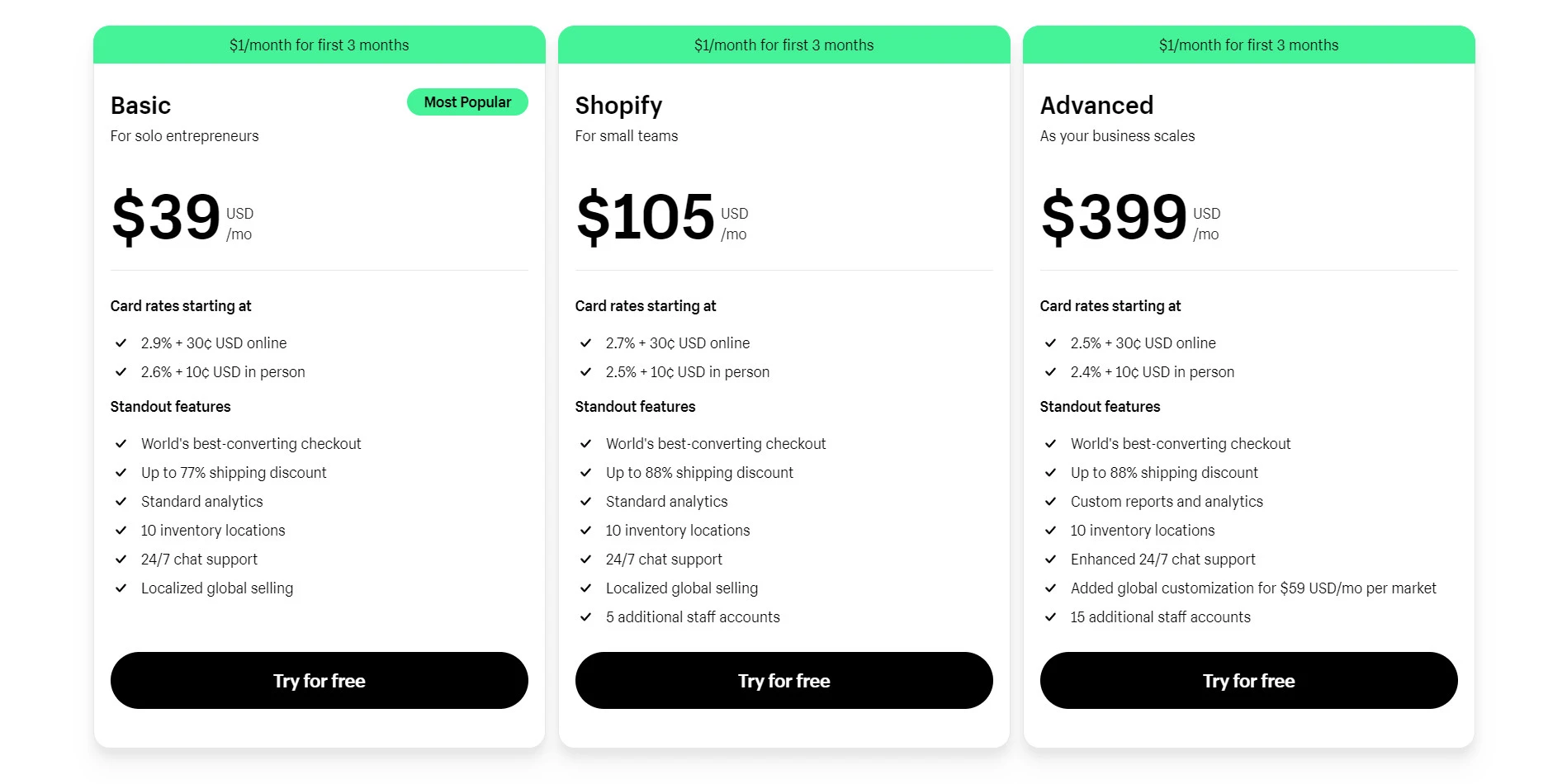
Salesforce Commerce Cloud, on the other hand, targets larger enterprises with a customized pricing model. The cost varies significantly based on the business’s specific requirements, sales volume, and the level of customization needed.
For your reference, here’s the pricing of Salesforce Commerce Cloud (B2C) as of writing this article:
- Starter: 1% Gross Merchandise Value
- Growth: 2% Gross Merchandise Value
- Plus: 3% Gross Merchandise Value
Also, it’s important to note that you’d have to pay an additional 1% GMV/order to unlock Salesforce’ order management features.
Generally, Salesforce Commerce Cloud is considered much more expensive than Shopify, on par with Shopify Plus (or even more).
⭐ Shopify wins.
Shopify’s pricing is more straightforward and budget-friendly for small to medium-sized businesses.
Ease of use
Shopify stands out for its ease of use, catering especially to those without technical backgrounds. Its drag-and-drop interface simplifies the process of adding products, managing inventory, and fulfilling orders, making the overall management of your online store straightforward.

On the other hand, Salesforce Commerce Cloud demands a certain level of technical proficiency for setup and ongoing management. For example, customizing the checkout process or integrating complex third-party applications can be challenging tasks that might require coding knowledge or the assistance of a developer.
⭐ Shopify wins.
While Salesforce Commerce Cloud offers extensive documentation, the platform’s complexity can present a steep learning curve for non-technical users, potentially making initial setup and customization more daunting compared to Shopify.
eCommerce features
Let’s continue our Shopify vs Salesforce comparison regarding the commerce features each platform has to offer.
⭐ Overall, it’s a tie.
Shopify and Salesforce Commerce Cloud both excel. Shopify leads in user-friendly POS and integrated payment features, while Salesforce outpaces in advanced CRM and order management.
Marketing features
No matter how life-changing your products can be, you need to promote your store effectively to drive sales. Hence, let’s examine Shopify vs Salesforce’s marketing features.
From our experience, Salesforce Commerce Cloud’s features are quite impressive thanks to its deep integration with Salesforce’s robust suite of marketing tools. Some notable marketing features of Salesforce are:
- AI-powered personalization for targeted content and product recommendations
- Cross-channel campaign management for a consistent brand message
- Advanced customer segmentation based on behavior and demographics
- Integrated marketing analytics to track campaign performance and ROI
- Email marketing with predictive intelligence for optimizing send times and messaging
- A/B testing different versions of your store to know which one converts better
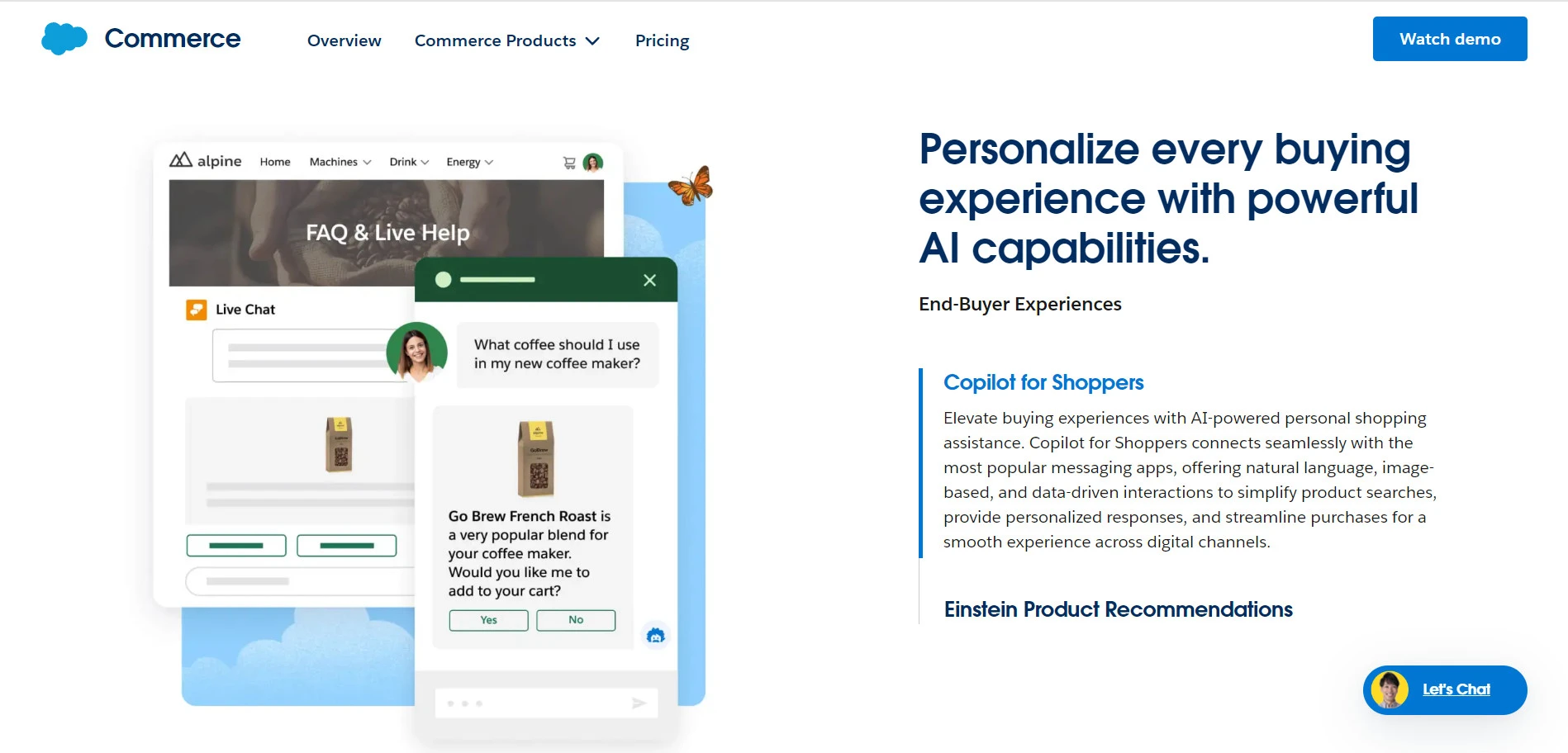
Shopify, while not as extensive, offers a strong set of marketing tools that are highly accessible like:
- Intuitive social media integration to market products on various platforms.
- Built-in SEO features to help improve organic search rankings.
- Simple tools for creating and automating marketing campaigns and emails.
- A comprehensive app store with 8000+ app extensions (we’ll discuss this later)
- Comprehensive sales analytics dashboard for monitoring store and campaign performance
⭐ Salesforce beats Shopify when it comes to marketing features.
Shopify’s built-in marketing functionalities are cool. However, without third-party apps, Shopify’s native marketing features cannot come to Salesforce’s level.
Templates and customization options
When it comes to pre-built themes, Shopify boasts a wider variety, offering over 180 themes in their theme store with 10+ free and 170+ premium options. Salesforce, on the other hand, doesn’t provide a set number of pre-built themes.
However, customization is where the tables turn. Salesforce shines with its unmatched level of customization. You can create and customize up to 300 unique themes, allowing complete control over your store’s look and feel. Shopify, while offering theme customization options, doesn’t offer the same level of granular control.
⭐ Shopify wins.
Though Salesforce allows you to create up to 300 themes, Shopify’s pre-made themes would make things much easier.
Third-party app integration
As listed and discussed above, Shopify and Salesforce both offer a wide range of eCommere and marketing features. However, from our experience, that will never be enough as you’ll need to add more features when your store grows. So, let’s examine Shopify vs Salesforce’s app store!
Both platforms offer extensive app stores, but Shopify again takes the lead in sheer numbers. Their app store boasts over 8,000 apps, with a significant portion being free.
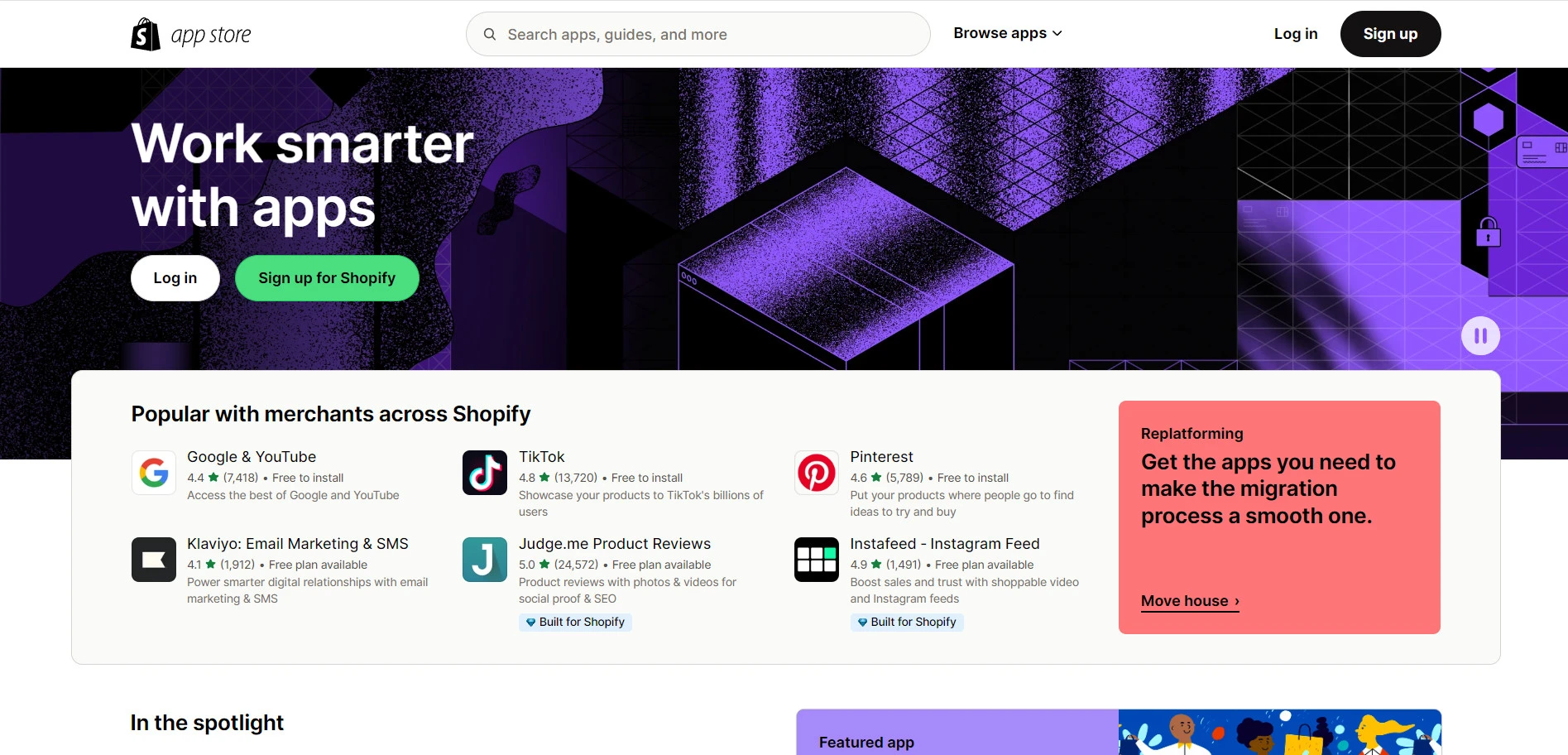
Salesforce Commerce Cloud’s AppExchange has a smaller selection, with around 4,000 apps that cater to enterprise-level functionalities.
⭐ Shopify defeats Salesforce.
Shopify App Store has over 8,000 apps, doubling the number of Salesforce. Hence, it’s clear who’s the winner.
Customer support
Managing your store is tiring enough. So ensure that the platform you choose provides helpful customer support in case you encounter technical issues you can’t handle yourself.
That makes customer support the last factor we use to compare Shopify vs Salesforce.
From what we and thousands of other merchants have experience, Shopify’s customer support is awesome for its 24/7 live chat support and email. Shopify even provides you with tons of self-help resources like community forums, extensive documentation, and an academy to help you overcome the platform’s learning curve.
Salesforce Commerce Cloud’s support is also strong, offering tailored packages and specialized assistance. However, when considering the accessibility and breadth of resources for all business sizes, Shopify stands out.
⭐ Shopify edges over Salesforce.
The support teams of Shopify and Salesforce are both competent; however, Shopify staff is more accessible. Also Shopify’s self-help resources are more extensive.
Shopify vs Salesforce Commerce Cloud – Who Are They For?
Now that our Shopify vs Salesforce comparison has come to an end, have you known which platform better suits you yet? Let us wrap everything up to aid your decision:
- Choose Shopify if you: want an affordable eCommerce solution that comes with powerful built-in eCommerce and marketing features.
- Choose Salesforce if you: are not concerned about cost and need a platform that provides you with advanced eCommerce, marketing, and most importantly, CRM features.
Check out LitExtension’s blog and join our active Facebook Community for all things eCommerce.